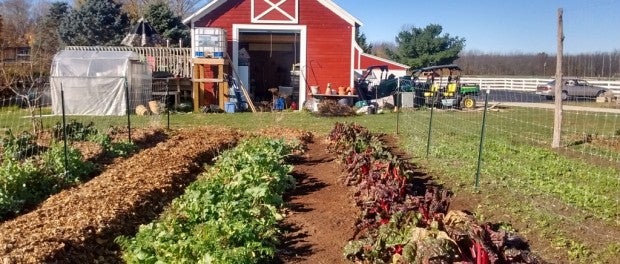Small Farms Winter Webinar Series

Mar. 2 – Growing Your Hobby Farm into a Business, Andy Larson, University of Illinois Extension Local Food Systems and Small Farms Educator – Raising food plants and animals for personal and family use is fun, but as the scale of your hobby grows, so do the costs. Sooner or later, you’ll probably wonder whether you should be treating these pursuits as a business, but there is more to this decision than finding tax write-offs. Do you have a feasible business model? Do you have a viable marketplace? Can you finance a farm startup? Join Andy Larson to learn what it takes to be an agri-preneur and to treat your small-scale farm enterprise like a business.
Mar. 9 – Do Your Bees Have PMS (Parasitic Mite Syndrome)?, Doug Gucker, University of Illinois Extension Local Food Systems and Small Farms Educator – Bee colony collapse is a problem for beekeepers. One of the large contributors to colony collapse is related to the introduction of bee mites and pests over the past 20 years. This webinar will focus on best management practices to reduce bee pests and the diseases they bring. It will stress: the warning signs of a bee pest problem, what to do to proactively reduce pest pressure in the hive and review tips on bee colony inspections.
Mar. 16 – Maximizing Windbreaks on Your Farm, David Shiley, University of Illinois Extension Local Food Systems and Small Farms Educator – Whether you have an established windbreak or are planning a new one, there are ways to increase its function and value. The primary function of a farmstead windbreak is to reduce the velocity of winter winds and reduce the impact of drifting snow. This can result in a direct economic benefit through lower energy costs. To help you achieve this primary goal, important design features will be presented. There are also many other benefits that can be derived from a windbreak, such as wildlife habitat, food production, livestock protection, landscape aesthetics, and screening from noise and sound. The techniques and examples of plant species combinations to achieve these other goals will also be presented during the webinar.
Mar. 23 – Benefits of Mulching Vegetables, James Theuri, University of Illinois Extension Local Food Systems and Small Farms Educator – Mulching can be a an attractive and profitable addition to any vegetable garden. Besides giving the garden a finished look, mulch can reduce the labor required for weeding, moderate soil temperatures, conserve water, and even improve yields. This presentation will provide science-based data to support these points, and help growers make decisions on type, timing, and management of mulches in the vegetable garden.
Mar. 30 – Soil Management for High Tunnels, Nathan Johanning, University of Illinois Extension Local Food Systems and Small Farms Educator – High tunnel production is very intensive and good soil management is a key aspect of maximizing production and crop health. Soil management can impact nutrient uptake, crop rooting, pest management, and water availability for the crop. Learn more about some specific considerations and techniques that can benefit your high tunnel production system.








 Your Privacy Choices
Your Privacy Choices
Leave a comment